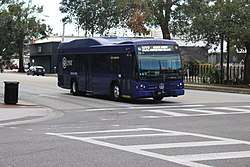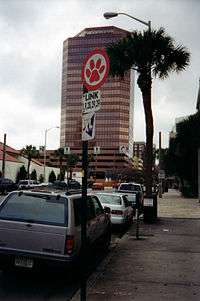Lynx (Orlando)
Lynx (stylized as LYNX) is a bus system run by the Central Florida Regional Transportation Authority, serving the greater Orlando, Florida area in Orange, Seminole, and Osceola counties with limited service to Polk County. Bus routes are referred to as Links. The standard adult one-way fare is $2 with free single transfers valid for 90 minutes (not valid on the same Link or for round trips). LYNX runs the zero-fare LYMMO Bus in Downtown Orlando, connecting many downtown destinations to parking and the LYNX Central Station by controlling traffic signals on a three-mile route along a fully separate right-of-way or a combination of separate right-of-way and mixed traffic. All LYNX buses, except the Lymmo, have bike racks (2 - 3 bike capacity) for use at no extra charge.
 | |
 LYNX bus on the Route 102 line in Orlando | |
| Parent | Central Florida Regional Transportation Authority |
|---|---|
| Founded | May 1972 |
| Headquarters | 455 N Garland Avenue, Orlando, FL |
| Locale | Greater Orlando, USA |
| Service area | Orange County, Seminole County, Osceola County, Lake County, Polk County |
| Service type |
|
| Routes | 84[1] |
| Stops | 4,441 [2] |
| Fleet | 301[1] |
| Daily ridership | 83,000[1] |
| Annual ridership | 26 million (2017)[3][4] |
| Fuel type | Diesel, Biodiesel, CNG |
| Operator | Central Florida Regional Transportation Authority[5] |
| Chief executive | Jim Harrison (interim, as of 2019) |
| Website | www |
Other LYNX services include a commuter assistance Vanpool program; Access LYNX paratransit service; NeighborLink (formerly PickUpLine) community circulators; and the Road Rangers roadside assistance program on Interstate 4 between Kissimmee and Daytona Beach, sponsored by State Farm.
Bus stop signs were designed with a lynx paw in place of the traditional bus stop signs, which show a bus; although newer signs have been placed, adding the paw to the traditional sign. Also, the route numbers are usually attached to the bus stop signs.
The budget for fiscal year 2019, which runs from October 2018 through September 2019 is $142,371,000.
History


The Central Florida Regional Transportation Authority was formed in May 1972 under the name Orange-Seminole-Osceola Transportation Authority (OSOTA). The bus service was originally named Tri-County Transit, or TCT for short. The authority changed its name in 1994 via a public naming contest and started doing business as Lynx.
The agency opened LYNX Central Station (LCS) in November 2004 and a new operations center called Lynx Operations Center (LOC) in 2007.
LYNX also opened through a partnership with the city of Kissimmee the Osceola Satellite Facility (OSF) to operate their Kissimmee routes Link 10, 18, 26, 55, 56, 57, 108, 306, 407, and 426. The only Kissimmee route that does not operate from OSF is FastLink 441 which is fully run out of LOC.
Routes
LYNX operates a total of 84 bus routes in the Orlando area, serving Orange, Osceola, and Seminole counties with limited service to Polk County. LYNX routes include Link local bus routes, Disney Direct commuter service to Walt Disney World Resort, FastLink limited stop bus routes, the LYMMO zero-fare service in Downtown Orlando, and NeighborLink community circulator buses providing curb-to-curb service through advance reservations.[6]
Fares
NOTE: all fares are free since late March 2020 out of respect of the COVID-19 outbreak and will stay that way up to further notice.
The base fare for Lynx buses is $2 for a single ride, which must be paid in exact change. A single transfer to another route is available for free, but must be used within 90 minutes of paying cash fare. A rolling 24-Hour Pass costs $4.50 and must be purchased onboard the bus. Lynx offers a rolling 7-Day Pass for $16 and a rolling 30-Day pass for $50; these passes may be purchased at the Lynx Central Station, online, the app, and at various retailers in the Orlando area.[6]
A Lynx Discount Fare ID allows for discounted fares for children ages 7 to 18, high school students, senior citizens over age 65, and persons with disabilities. The discount fare costs $1 for a single ride, $2.25 for a rolling 24-Hour Pass, $8 for a rolling 7-Day Pass, and $25 for a rolling 30-Day Pass.[6]
Under 7 can board for free with fare-paying rider; 3-kid-limit applies.
Notes and references
- LYNX Fast Facts
- "Bus Shelter Program - Public Transportation Services for Orange, Seminole and Osceola Counties". Web.archive.org. 2012-08-20. Retrieved 2014-01-18.
- >2012 Annual report Lynx Archived 2013-08-16 at Archive.today
- 2012 Annual report Lynx Archived 2013-08-16 at Archive.today
- LYNX About Us
- "Lynx Schedule Book" (PDF). Lynx. Retrieved July 25, 2018.
External links
| Wikimedia Commons has media related to Lynx (transportation). |